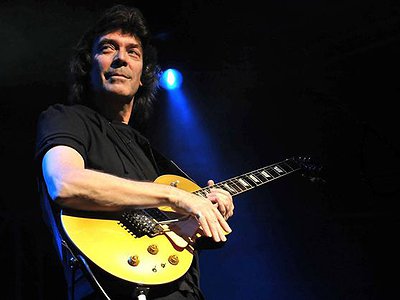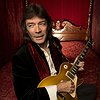The effect of a piece doesn't merely depend on the performance of the musicians, but also on the place it is performed at. How do you see the relationship between location and sound? In how far do you feel the current system of concert halls is still the right one for your music – or for contemporary music in general?
I generally find I can adapt to most locations. Every experience is different but most of the time it's ok as long as the facilities function correctly! Music locates itself within the given space.
The role of the composer has always been subject to change. What's your view on the (e.g. political/social/creative) tasks of composers today and how do you try to meet these goals in your work?
I like to feel that I can reach beyond the boundaries of current activities or political expectations. However, the areas where I feel strongly such as the need to build bridges in society and to oppose racist attitudes I sometimes put into lyrics. My song 'The Fundamentals of Brainwashing' is one of these.
How, do you feel, could contemporary compositions reach the attention of a wider audience?
There need to have more cross-over moments between genres and cultures.
Music-sharing sites and -blogs as well as a flood of releases in general are presenting both listeners and artists with challenging questions. What's your view on the value of music today? In what way does the abundance of music change our perception of it?
I think it's important for people to be open to the many kinds of music that are around and not just to fall back on the most prevalent sounds. The only difficulty with the way people listen to different pieces is that the attention span can be too short. When people listened to whole CDs more, they gave the music more of a chance.
Composers have traditionally found it hard to secure a living with their art. What are the financial realities you're living with and in which way, do you feel, could they be improved?
It is important for musicians to do live shows as well as albums to both connect with their audiences and to earn a living. It also helps to publicise one's shows and albums as much as possible to help get through to a wider audience.
Usually, it is considered that it is the job of the composer to win over an audience. But listening is also an active, rather than just a passive process. How do you see the role of the listener in the musical communication process?
It's good to hear individual interpretations because they help to widen the musician's horizons. Also it's a matter of listening being active whilst hearing is passive. The audience is the true owner of the compositions. The writer is the messenger.
Please recommend two artists to our readers which you feel deserve their attention.
Richie Havens, a great friend of mine who has just passed on, with his tremendous voice and loving pacifist message.
Joe Bonamassa, a great guitar player.
To find out more about Steve Hackett, visit his homepage at www.hackettsongs.com



